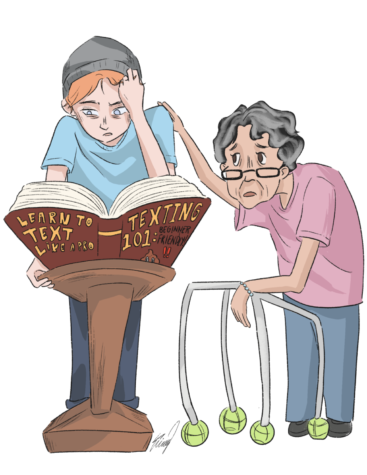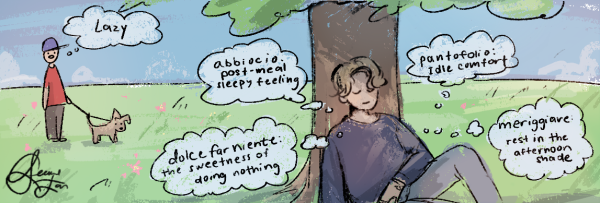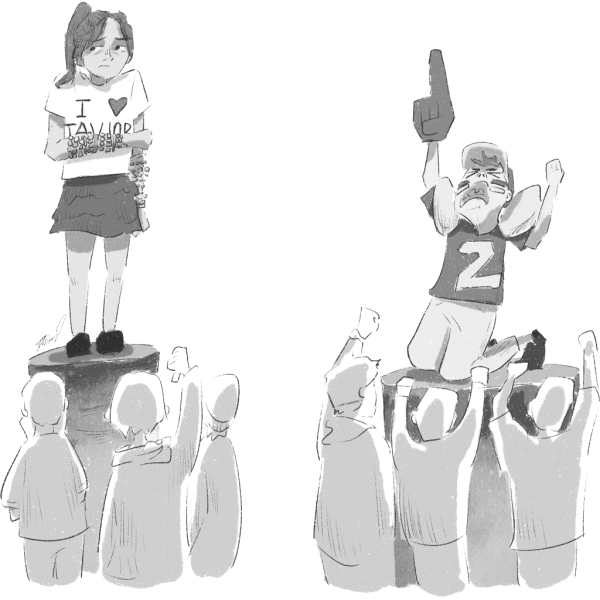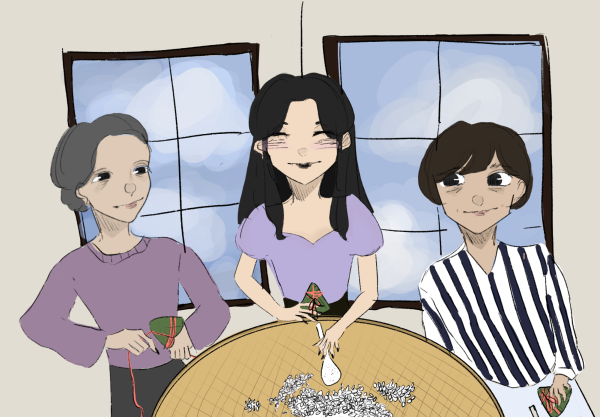Texting is Weird
April 6, 2023

Texting is perhaps the least understood of all English dialects. We all participate in its convoluted structures, yet when asked why adhere to the styles we do, we say something vague about not liking the way capital letters look.
This is a guide for all those poor souls who do not know the difference between liking a text in a thread, or leaving a stand-alone thumbs up emoji. Consider this a texting style guide.
As a horrible texter myself, we will dive into the intricacies of texting lingo and come back with scores of new knowledge about the complex social structure that is online communication.
Let’s start with a foray into punctuation. Do not use it. In general, using a period, or (gasp) a semicolon, is construed as extremely formal. In addition, periods often covey anger, which if paired with the wrong word, can spell disaster for your text conversations.
A period at the end of: “Okay.” can change the meaning of a simple acquiescence of a request, to a passive-aggressive consent, one which will likely not be honored. For this particular word, in fact, consider avoiding it altogether. Instead, if you want to sound literate, use the words “mmkay” and, “fs,” which convey a greater sense of amicability.
Other variations include: “ya”, “np”, “kk”. As you can see, two-letter abbreviations are quite popular, and not just as synonyms of the word “okay”. The fewer letters you can use to communicate effectively, the better.
Because speed is often of the essence when it comes to texting–especially in group chat scenarios–typing a paragraph is impractical when 30 people are shooting texts, transitioning through thousands of topics without seeming to pause for breath. For my fellow chicken-peckers: split up your sentences. Three words max. Throw the rules of grammar and syntax to the side. Split your sentences into easily typable soundbites, and spit those bad boys into the whirlpool of text messages, hoping that once you put the first segment in there, the rushing current will pause for a moment, allowing you to say:
“ya I”
“rlly think that ur ”
“Lil sis was super”
“weird”
Hopefully with this technique, you will be able to make your indelible mark on the extremely important issues in your group chat.
Another important distinction to make is the one between hehe, and heheh. I have been informed by many trustworthy sources that these two extremely similar phrases convey different types of laughter. The way it was described to me was this:
“Hehe is mischievous and plotting, playful even. It’s light and airy, like a spring breeze,” my source said.
Heheh is a different story.
“It’s like if someone asked you if your article was done cause it’s been almost a week, and you say heheh, It’s kind of a guilty laugh, a chuckle even,” Siu said.
One of the rules that I have found the most difficult to understand is the myriad of restrictions around emoji usage.
Much to my disappointment, one of the emojis I most frequently used to incorporate into my text messages is apparently, and I quote, “an extreme dad-move.” Now, the emoji I am talking about is the thumbs-up emoji.
Much like a capital letter, never use one. Unfortunately, this universal symbol of benign agreement is seen as only something a 50-year-old man would send in his messages.
When you need to agree with something, instead, take the two extra steps, click and hold on the message and “like” the text. It still is formal though, and I urge you to go back to the responses mentioned above: ya, np, kk, ect.
Another emoji mishap, one which has had a great impact on my self-confidence in texting, is the usage of “:)” and 🙂. According to every single person I talked to, 🙂 is passive-aggressive. While you may be screaming at the page right now, saying: “everyone knows that!” tell that to the text I sent to an acquaintance saying:
“Oh, no worries, I hope you feel better 🙂”
When I showed the text message to my tablemates, their jaws dropped in horror. Note to myself and (hopefully) the hundreds of other people who do not know this “:)” is always a better alternative if you genuinely want to portray happiness or goodwill.
Here is my next of advice: how to get out of a conversation. Now, th
is is extremely important, as a “bye” out of the blue can make it seem like you left the conversation due to the last thing they said (speaking from experience), which might make them think that you disliked it, which might make them think you dislike them, and maybe they’ll hold a grudge against it, and then shun you tomorrow, and … Ok, maybe it’s just safer to say, “sorry I gtg! My mom is telling me to *Insert non-suspicious chore here.*”
Now, to finish off, let’s talk about the use (or lack thereof) of grammar in texting. While some things, like conjunctions, are used…
Oh, wait, I’m really sorry
i just heard my mom
and she’s telling
me i need to sweep the lawn, i gtg “:)”






